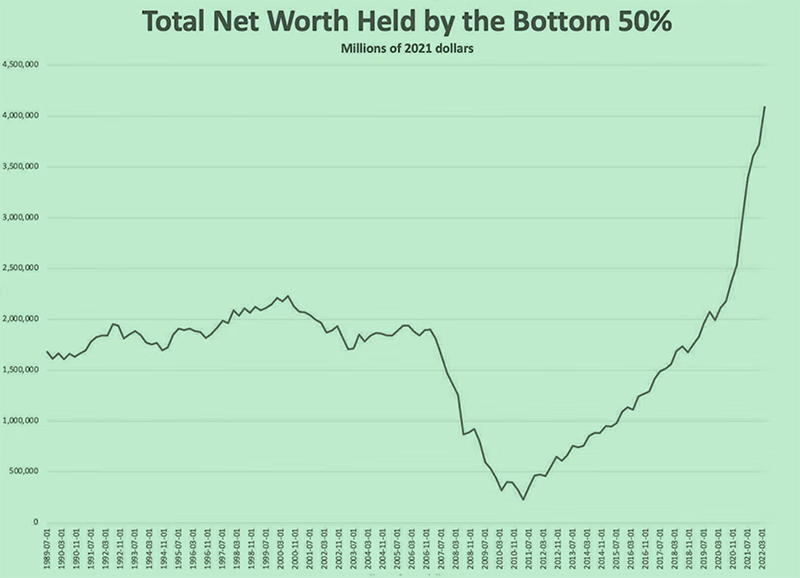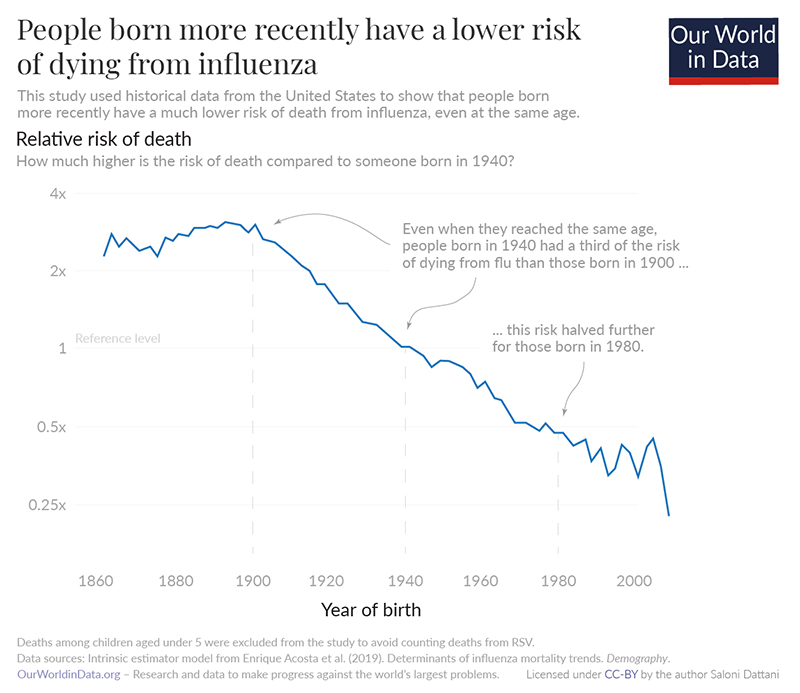Volcanoes are erupting in The Philippines, but on-fire Australia received some welcome rain. The Iran war cries have been called off and The Donald’s military powers are about to be hamstrung by the Senate. Meanwhile, his impeachment trial is starting, and we’re all on Twitter for a front-row seat.
What Could Go Right? The poorest Americans doubled their net worth
Plus, singing baby sea turtles, Britain's first PM of color, and a civility test
This is our weekly newsletter, What Could Go Right? Sign up here to receive it in your inbox every Thursday at 6am ET. You can read past issues here.
The poorest Americans doubled their net worth
“Everyone I know is doing better than they were two years ago,” someone told me this week. “Is that just because I’m a middle-aged white guy?”
I laughed at the way the question was phrased, but it is a valid one. And the truthful answer is contrary to the common narrative. In a late September edition of this newsletter, we covered a Credit Suisse report that showed that the bottom 50 percent of the United States population got wealthier during the pandemic. At the time the only coverage of this we saw was from Axios. There may have been others, of course, but by and large this story hasn’t broken into major headlines.
So this week, it was interesting to see The Intercept pick it up, illustrating data from the Federal Reserve—that we have also previously mentioned in this newsletter—that shows two things. One, that the net worth of the bottom 50 percent doubled during the pandemic. Two, that it’s the highest it has been in US history.

How did we get here? Rising home prices, the pandemic-era stimulus checks and expanded unemployment benefits, and the tight labor market since. As for inflation, as Jon Schwarz, the writer of The Intercept article, says, “even as prices have gone up, wages have mostly kept pace.” Inflation has also been helpful for homeowners with fixed-rate mortgages.
There are some other strange but good post-pandemic outcomes that were out of the scope of Schwarz’s article. The stimulus checks, for instance, had another positive knock-on effect for poor Americans: lots of people who wanted them signed up for a bank account in order to get them. This has led to the highest share of banked households in US history. In 2021, only 4.5 percent of the population was unbanked, down from 7.6 percent in 2009, when the numbers first began to be measured.
Meanwhile, the turn to remote work has led to a jump in the employment of American adults with disabilities, from 31 percent pre-pandemic to 35 percent in September. It’s a record, The New York Times reports, “in the 15 years the government has kept track.” And it’s not just jobs, but better jobs, with higher salaries and more flexibility.
To come back around to Schwarz, these new numbers are “not to say that America’s poorer people are living in clover—they’re not.” But he arrives at the same conclusion our founder, Zachary Karabell, did in his TIME piece last week. Nobody likes inflation, but the poorest among us are better off now than they were in pre-inflation times. Cooling off the economy may help bring inflation down, but it may also threaten the circumstances that have benefited the Americans most vulnerable to economic headwinds.
Quick links: representation wins
Liz Truss did not last longer than a head of lettuce, but we appreciated this graphic from GZERO Media on where women are currently in power. Truss is being followed up by Rishi Sunak, who will be Britain’s first prime minister of color, as well as the first Hindu. He’s the youngest, too. For what that means to young Brits of color—and given you speak TikTok—you can watch this sweet video. (Reports are also coming in that Sunak might be a magician.)
Many newsletter readers write in asking what they can do to enact change. Each person’s answer is different, we think, and the key is to find a way that inspires you. Here’s one that inspired us: British physicist Jess Wade has written 1,750 Wikipedia entries for female and minority scientists with notable but unrecognized achievements.
We also enjoyed meeting the “world’s first openly gay imam.”
Before we go
Did you know that baby sea turtles sing to each other from within their eggs so they can all hatch at the same time? You most certainly did not, because scientists have just discovered that over 50 sea creatures we thought didn’t communicate actually do. Including sea turtles! As for the synchronized hatching, it’s a bid to ward off predators through sheer numbers.
Can you pass this civility test written by The Progress Network (TPN) Member Robert Talisse, published in The Conversation? Quoting directly:
- Take one of your strongest political views, and then try to figure out what your smartest partisan opponent might say about it.
- Identify a political idea that is key to your opponent and then develop a lucid argument that supports it.
- Identify a major policy favored by the other side that you could regard as permissible for government—despite your opposition.
“If you struggle to perform those tasks,” Talisse writes, that means you have a “feeble grasp on the range of responsible political opinion.”
We have to give a shoutout to podcaster Lex Fridman, who is Jewish and grew up in the Soviet Union, for this master class on how to maintain moral limits but reach out with understanding. You won’t expect the outcome of this 2.5-hour interview with rapper Kanye West. If you don’t have that much time to spare—who does—you can skip around to the parts that address West’s recent social media controversy by following the timestamps in the video’s description.
Below in the links section, carbon-capturing drones, climate-adapting narwhals, and more.
(Not So) Secretly Sexy
Georgians are still showing up to vote early in record numbers. The turnout is historic.
- 1,123,329 | Number of Georgians who have voted as of October 26
- 743,772 | Number that had voted at this point in 2018

Op-ed: More speech, not bans, is the lasting solution to hate speech

Is deplatforming individuals like Donald Trump, Kanye West, and Andrew Tate more harmful than helpful? | Read more
Midterms, gerrymandering, bias, and conspiracy

This week on the What Could Go Right? podcast: Social media sensation and former high school government and law teacher Sharon McMahon joins us to discuss the need for a better understanding of how the government works. Plus, what to expect for the midterms, the latest on gerrymandering, and an encouraging trend in US military mental health programs. | Listen to the episode
These three countries are making major strides in public health

Three examples of the many strides public health officials, hand in hand with scientists and care workers, are taking to bring various maladies to heel | Read more
🎉 Help us share progress far and wide!
👉 Focusing only on the negative wrecks our mental health and sabotages potential improvements. We want to flip that narrative so as to usher in a future we can be proud of.
🙏 We’re a nonprofit, and our content remains free for all. Thank you for your support of our work.
Progress, Please
(Found good news? Tweet at us @progressntwrk or email.)
Other good stuff in the news 🦬
Energy & Environment:
- CO2 emissions rose more slowly in 2022 | AP
- EU produces record wind and solar energy as it shirks Russian gas | CNN
- Solar powers India towards its 175GW renewables target for 2022 | Energy Monitor
- Bill Gates-led fund makes green jet fuel as cheap as oil-based competitor | Bloomberg
- French farmers are covering crops with solar panels to produce food and energy at the same time | Euronews
- South Africa is building the world’s biggest green ammonia plant for $4.6 billion | CNN
- New Zealand zoo more than doubles its population of endangered lemurs | Asharq Al-Awsat
- Wild baby bison born in the UK for first time in thousands of years | Euronews
- Narwhals adapting to climate crisis by delaying migration | The Guardian
- Electric bus debuts in Nairobi in clean energy push | Africanews
- There’s plenty of good news about the environment | New York Post
Science & Tech:
- NASA’s Webb takes star-filled portrait of Pillars of Creation | NASA
- First known map of night sky found hidden in Medieval parchment | Nature
- A new tool for eruption forecasting: carbon-catching drones | Wired
- The pandemic uncovered ways to speed up science | Wired
- Instagram’s surprising strategy for bullies: Tell them to be nice | Vox
- Electric planes will take to the skies this decade | Reuters
Politics & Policy:
- Social Security to accept people’s self-identified gender identity | The Hill
- Germany to spend 6.3 billion euros on push for electric car charging points | Reuters
- In race to end homelessness, San Antonio takes the lead | Bloomberg
- Turns out sometimes the government can get things right | The New York Times
Public Health:
- Covid-19 or the flu? New antigen tests are capable of differentiating between the two | El País
- ‘No new HIV cases by 2030’: England hopes to become first country in the world to defeat virus | The Guardian
- The road to making birth control pills over-the-counter in the US | Axios
- Chicago’s mental health crisis pilot is off to a promising start | Bloomberg
- Zimbabwe becomes first African nation to approve HIV prevention drug | The Guardian
- US military suicides decreased by 15% between 2020 and 2021 | PBS NewsHour
- Why doctors are studying new drugs to treat women’s midlife mood swings | The Wall Street Journal
Society & Culture:
- Inside the UK’s new police approach to tackling rape | The Guardian
- There are more women on TV but ageism persists, says new study | NPR
- Training people recovering from substance abuse disorders to be part of treatment teams | Good Good Good
- How Iranian men are standing up for women, life, and freedom | The New Arab
TPN Member originals 🧠
(Who are our Members? Get to know them.)
- Pre-registering some takes on the midterms | Matthew Yglesias
- Why Republicans are surging | David Brooks
- There’s been a ‘regime change’ in how Democrats think about elections | Matthew Yglesias
- Lis Smith on what Democrats do wrong | Yascha Mounk
- Why young people are down on democracy—and how we can change that | Manu Meel
- How to stop being so envious | Arthur C. Brooks
- ‘Privacy is essential to human flourishing’ | Danielle Citron
- Are China and America destined for war? | James Pethokoukis
- Why we all fall victim to bystander apathy | Steven Pinker
- There are only five media stories. But now I am ready to start on number six.
| James Fallows - How Trump dominates the GOP and ‘impressed’ these DC journalists | Ian Bremmer
- The global war for young talent will shape the future | Parag Khanna
- The disturbing direction of MAGA rhetoric about race | Theodore R. Johnson
- How to spend time on what you value | Arthur C. Brooks
- Putin is onto us | Thomas L. Friedman
- Why is this generation struggling so much? | Scott Galloway
- We advised Biden on the pandemic. Much work remains to face the next crisis. | Ezekiel J. Emanuel
- Non-member add: The Great Progression, 2025-2050 | Peter Leyden
Department of Ideas 💡
(A staff recommendation guaranteed to give your brain some food for thought.)
The boys feminism left behind | Common Sense
You don’t upend a 12,000-year-old social order without experiencing cultural side effects.
Why we picked it: We don’t have to choose between empowering girls and women and addressing the unique challenges facing boys and men. Doing both things benefits us all. —Brian Leli
New Book Alert
Privacy is disappearing. From our sex lives to our workout routines, the details of our lives once relegated to pen and paper have joined the slipstream of new technology. As a MacArthur fellow and distinguished professor of law at the University of Virginia, acclaimed civil rights advocate and TPN Member Danielle Citron has spent decades working with lawmakers and stakeholders across the globe to protect what she calls intimate privacy—encompassing our bodies, health, gender, and relationships. The Fight for Privacy takes the focus off Silicon Valley moguls to investigate the price we pay as technology migrates deeper into every aspect of our lives: entering our bedrooms and our bathrooms and our midnight texts; our relationships with friends, family, lovers, and kids; and even our relationship with ourselves.
Learn more about the book and buy it here.
Until Next Time
Don’t forget to (humorously pretend to) check your kids’ Halloween candy. 👇



